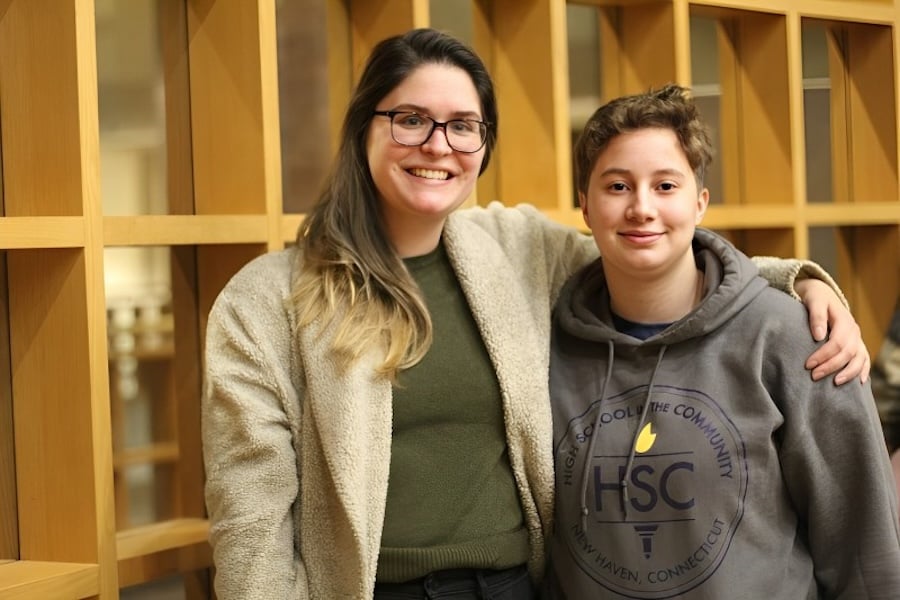
Culture & Community | Education & Youth | LGBTQ | Arts & Culture | New Haven Public Schools | New Haven Board of Alders
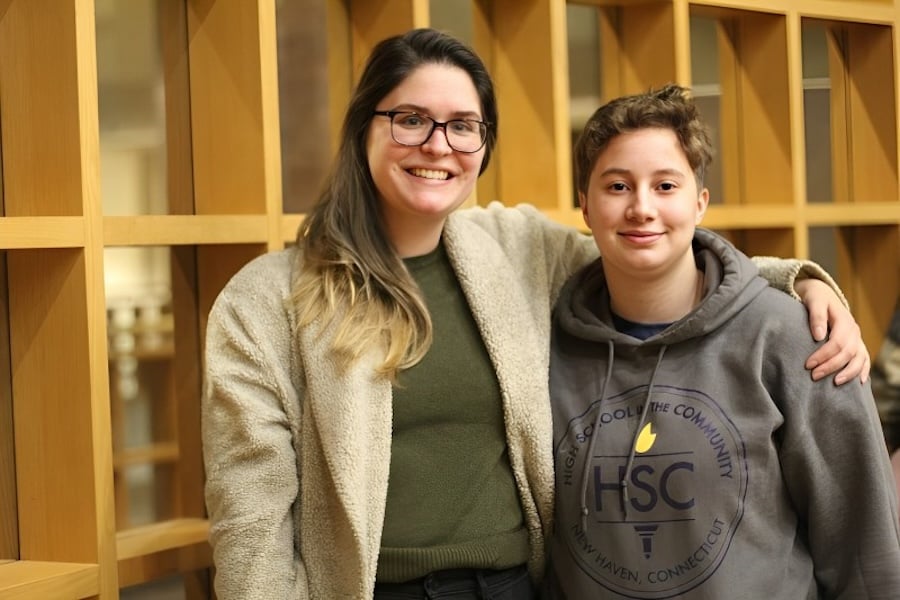
HSC teacher Amy Brazauski and her foster son, Alex Lopes. Lucy Gellman Photos.
The first time English tecacher Amy Brazauski met Alex Lopes, his deadname was on her class roster, without any indication that he was trans. A year later, when she took him into her home as a foster mom, it was to provide a sense of safety, support, and consistency that had been missing from his life. Now, she’s advocating for safer and more inclusive schools for all LGBTQ+ youth across the district—and her son is too.
Brazauski, a dedicated foster mom and teacher at High School in the Community, brought that message to the New Haven Board of Alders’ Education Committee Wednesday night, during a workshop on school climate and support for LGBTQ+ youth in the New Haven Public Schools.
In over an hour of testimony from youth, parents, educators and advocates, New Haveners painted a damning portrait of a district that has largely failed its LGBTQ+ students, from lack of inclusive resources and gendered school bathrooms to teachers who deadname and misgender their students.
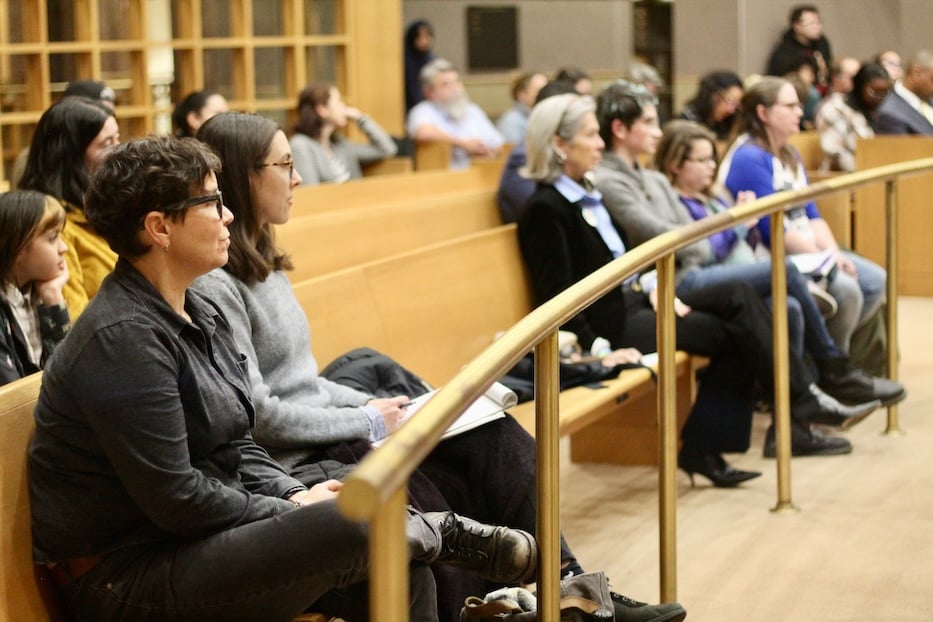
Erin Michaud, who is a member of the city's. LGBTQ+ Youth Task Force.
The workshop comes almost exactly two years after the city’s Board of Education first passed a policy for transgender and gender nonconforming youth that was heralded as “lifesaving” and long overdue, and five months after a 2022-2023 Schools Climate Survey that showed a lower sense of safety and belonging among LGBTQ+ students, particularly those who identify as trans and nonbinary.
For just over two hours Wednesday, alders both received insight into how that policy has been implemented—or not implemented—across the district, and received a series of asks from both the city’s LGBTQ+ Task Force and young New Haveners who are actively experiencing discrimination in the city’s schools.
“My son’s story is just one of the many that have demonstrated the essential safe place that school can provide, but as we have heard tonight, the current state is not enough,” said Brazauski, whose testimony so moved Lopes that he ended up speaking off the cuff before the end of the night. “Furthermore, I also know that we must care for our amazing educators, who also face challenges as they share their identity and identify as LGBTQ+ in the workforce.”
“We Have Essentials In Place”
.jpeg?width=933&height=622&name=EduWorkshopNov23%20-%201%20(2).jpeg)
Before a parade of students, parents, teachers and community members took the mic, representatives of the New Haven Public Schools briefed the committee on their work to promote inclusive school environments across the district (read the presentation here). Often, it showed firsthand the disconnect between the district’s goals and the immediate and urgent needs of students in New Haven’s 42 public schools.
“We are committed to providing safe, supportive, welcoming and inclusive environments in New Haven Public Schools,” said Dr. Michael Finley, NHPS chief of staff, pointing to the district’s 2020-2024 strategic plan. “We do this through increasing awareness, building capacity, providing safe spaces and consulting with various stakeholders.”
“We understand that we have to have essentials in place for our LGBTQ+ students,” he added. “It’s extremely important.”
But in the following presentation and back-and-forth with alders that followed, it seemed that representatives did not understand the extent of how important that was, or what some of those essentials looked like.
Since the passage of Policy 5145.33 in 2021, the district has launched several policy-specific trainings, including “safe environments for LGBTQ+ youth” in 20 of 42 schools, all-staff briefings on mental health issues, staff and faculty trainings on bullying and Title IX, and training administrators in implementation of the Transgender and Gender Non-Conforming Youth Policy.
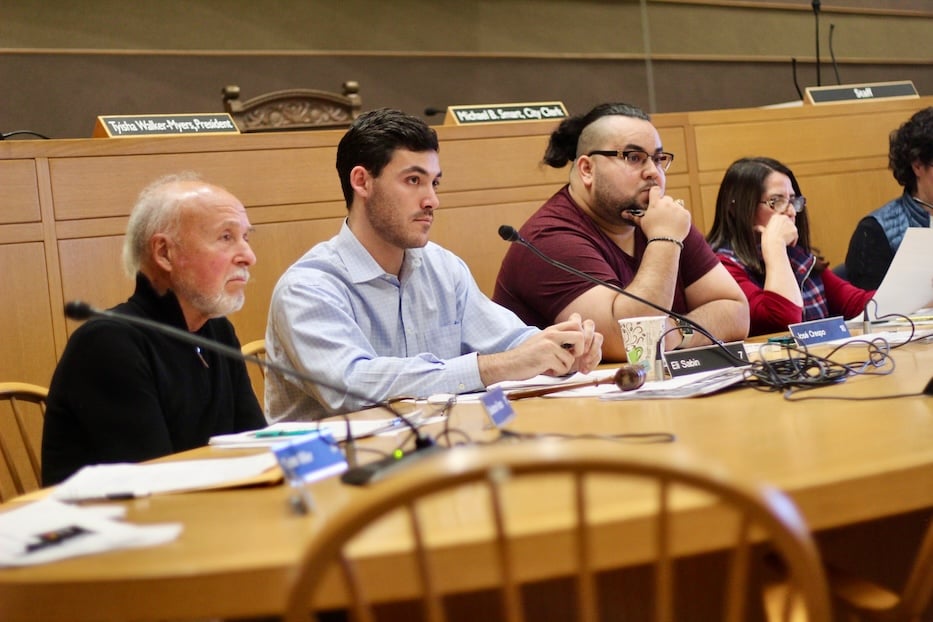
Education Committee Members Sal Punzo, Eli Sabin, José Crespo, Claudia Herrera and Amy Marx.
The trainings are currently taught by law firms, according to the representatives who spoke Wednesday night. The district did not reply to a request for the names of the firms, or to whether the trainings are taught by people with lived experience as members of the LGBTQ+ community.
Typhanie Jackson, executive director of student services for NHPS, said that the district has also taken new steps to incorporate social and emotional learning (SEL) and heightened self- and social awareness in its classrooms, and implemented district-wide efforts to better honor students’ name changes, pronouns, and gender identities.
Jackson added that the district has been working to support more LGBTQ+ Pride events and Gender and Sexuality Alliances (GSAs) in both middle and high schools, and has ensured that 82 percent of New Haven’s high schools now have all-gender restrooms. Going forward, she said, the district plans to implement an annual training in Policy 5145.33, add better signage to all-gender restrooms in schools, and roll out a webpage for LGBTQ+ resources that is already in the works.
“We know there’s still some more things that have to happen,” she said, acknowledging that some of the feedback the district has received has showed lower student morale and higher absenteeism among LGBTQ+ students who do not feel supported. “So again, really looking at this from a point of view of capacity building, looking at direct services that we provide, looking at inclusive spaces, and looking at stakeholder input to hold us accountable.”
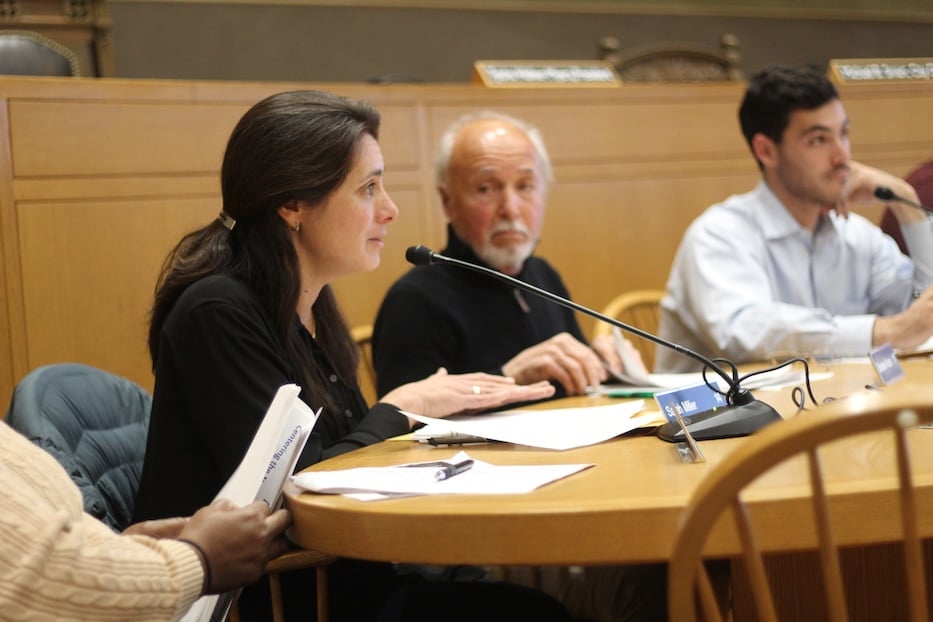
Fair Haven Alder Sarah Miller.
Some of that input followed Wednesday. Fair Haven Alder Sarah Miller, who is also a New Haven Public Schools parent, remembered watching her sons’ preschool teacher transform her own classroom after learning about “different kinds of families” at a professional development training. Within days, the teacher had printed out new, more inclusive materials for her students and begun using broader language in the classroom. A mention of a mom and dad, for instance, was replaced with "a mom and a mom."
“And I’m wondering, what kinds of initiatives are happening in preschool, and elementary school, to talk about various kinds of families and various kinds of people?” Miller asked.
Nally Sahin, a health and physical education teacher, pointed to “more inclusive language” and updates to the district’s health curriculum that have been taking place since last year. But when Miller pressed representatives on curriculum development, such as inclusion of LGBTQ+ history or literature, they came up empty.
“I don’t want to speak out of turn, so I couldn’t tell you,” Jackson said.
“You mentioned numbers around how LGBTQ folks are feeling, that their emotional wellness and mental health is lower,” said East Rock/Downtown Alder Eli Sabin. “I was wondering if you view that as a crisis, and how the district is making sure that in all the decision making that is going on, we’re centering and focusing on that challenge.”
“This is where we know in schools that we have to make sure we’re doing our due diligence and how critical it is for students within our LGBTQ community,” Jackson said, declining to call it a crisis. “We understand that there are students who are really really struggling, who we want to make sure that we can understand how to give them help.”
“It Needs To Be More”
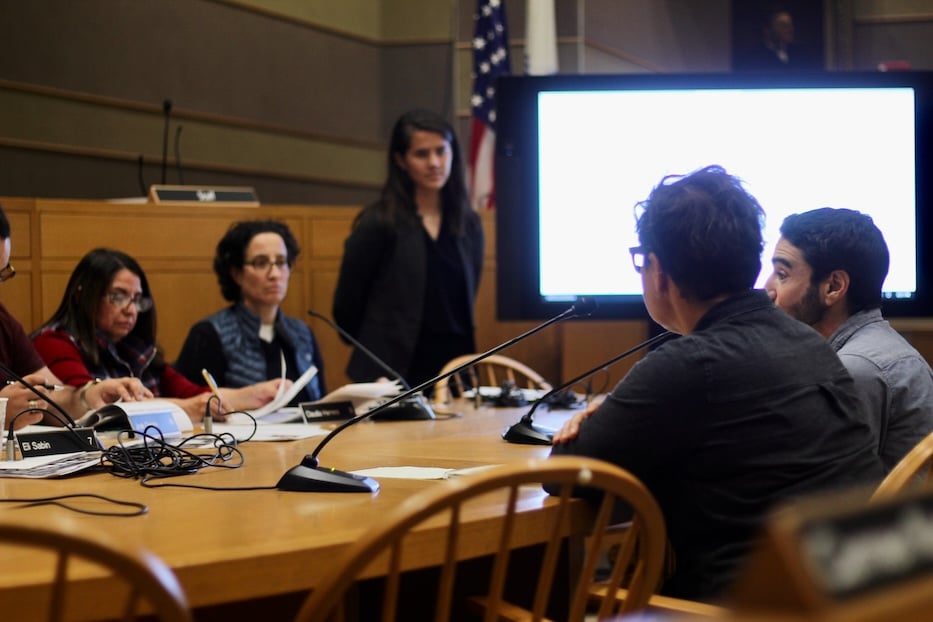
Erin Michaud and David Weinreb, who are both members of the city's LGBTQ+ Task Force. Weinreb also praised the work of New Haven Academy's Fana Hickinson, in whose stead he appeared.
Focusing on those student needs, representatives David Weinreb and Erin Michaud of the city’s LGBTQ+ Youth Task Force presented committee members with an ask for increased district support, both in and well beyond the classroom. As they spoke, both stressed the importance of making sure LGBTQ+ inclusive policy begins not in middle or high school, but much earlier.
Weinreb is a magnet resource teacher at Elm City Montessori School, from which several students came out to testify; Michaud teaches visual art at Cooperative Arts & Humanities High School downtown.
“We don’t start this work with 14-year-olds, we start with children at the beginning,” said Weinreb, pointing to the “damning” results of the 2021-2022 and 2022-2023 schools climate survey. “We’re here to build a community of advocates and ensure that we are here to help connect anyone who is trying to fight and make sure that LGBTQ youth are healthy, safe and well.”
To address that safety, Michaud continued, the LGBTQ+ Youth Task Force currently has five asks for the Board of Education, NHPS Schools Superintendent Dr. Madeline Negrón, and the New Haven Board of Alders. Those include more visible and vocal district support for students, a fully-funded GSA at every middle school (currently there are “two-ish,” Michaud said), comprehensive and up-to-date training for all NHPS staff, increased inclusion of LGBTQ+ inclusive material across K-12 curricula, and full-time, fully-funded social workers, counselors, and psychologists in every school—with caseloads that they can handle.
“It requires a lot of work, and a lot of money, and our children deserve it,” Weinreb said.
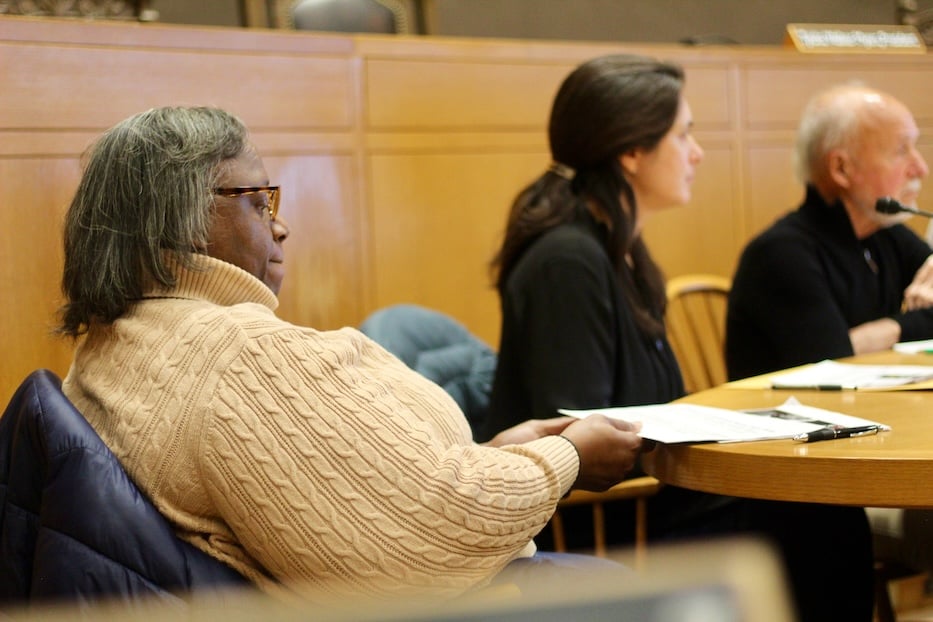
West Rock/West Hills Alder Honda Smith.
Michaud, who identifies as a member of the queer community, stressed that visible, demonstrated support isn’t just important for LGBTQ+ students: it’s also important for their straight and cisgender peers, for allies, and for staff of all backgrounds and gender identities. After 24 years in the district, there’s so much more that she believes the New Haven Public Schools can and should be doing to support LGBTQ+ youth and faculty alike.
She recalled a recent interaction with a young trans student, in which she confided in Michaud that she’d been kicked out of the girls’ bathroom by a school security guard.
“Honestly as a queer person, I feel a little bit invisible in our city,” she said. “As a queer teacher, I feel invisible in this city. Our students … they feel invisible, they feel unseen, they feel unheard, they feel unwelcome. Their attendance is poor. They feel sad. They don’t want to come to school.”
Michaud added that she wants to see a greater effort across the district to support GSAs, which have been proven to increase feelings of safety and belonging among students where they exist. When she left L. W. Beecher Museum Magnet School of Arts and Sciences last year for a job at Co-Op, she found that the school’s GSA struggled to stay afloat in her absence. For years, she and a colleague had kept it going; he struggled to do it alone.
“What is happening is just, it’s a lot of individuals who are doing this work, which is great,” Michaud said. “But it needs to be more.”
“A Work Of Heart”
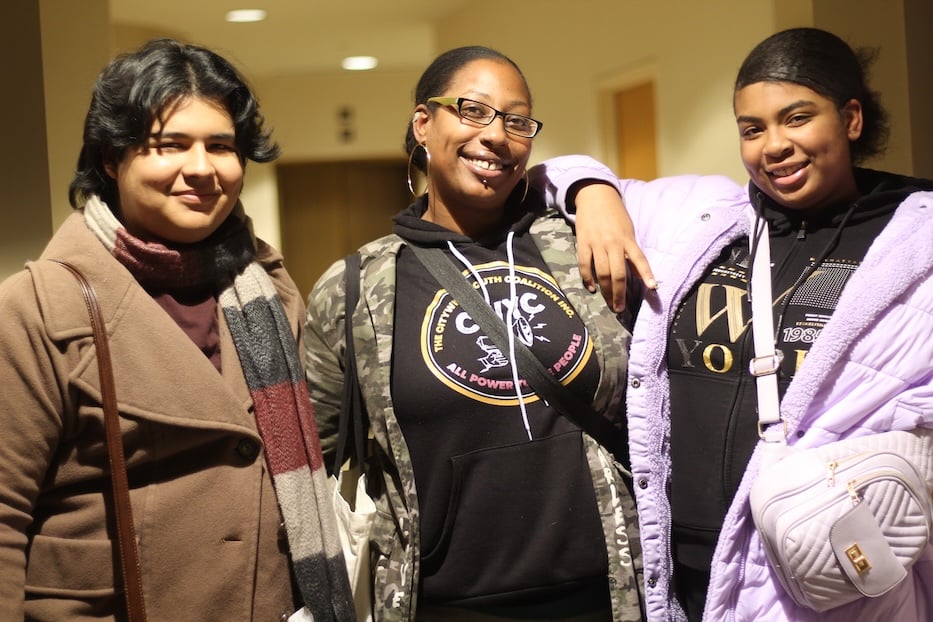
Harmony Solomon Cruz-Bustamante with Ta'LannaMonique “T’Mo” Lawson-Dickerson, youth services coordinator at the New Haven Pride Center, and their daughter Khloé Lawson. "What is important is the analysis of the training, the quality of the training, and who is actually providing the training. Having a straight, cisgendered person do a training about LGBTQ folks might not be the best fit," Lawson-Dickerson said during their testimony.
Nowhere, perhaps, was that clearer than during over an hour of public testimony from NHPS students, parents, healthcare workers, LGBTQ+ advocates, educators and concerned city residents. Speaking early in the evening, Wilbur Cross High School senior Harmony Solomon Cruz-Bustamante addressed the repeated bullying they experience at school, including as recently as last month. No LGBTQ student should have to experience that in a learning environment, they said.
“Combatting homophobia, transphobia and anti-queerness among adults and students is cultural work,” they said. “It’s a work of heart. It’s not something that can be written down and implemented through policies and books and statutes. I call on the district and the local government to provide material resources and funding to these GSAs, so that these students and teachers can carry out that work.”
As the senior student representative on the New Haven Board of Education, Cruz-Bustamante both echoed members of the LGBTQ+ Youth Task force, and urged alders to remember the multiple marginalized identities at which many of New Haven’s queer students stand. Those include, for instance, many of the district’s Black and Brown students, as well as students experiencing poverty, strife and lack of safety at home with their families, and homelessness.
“[They] not only have their queerness suppressed, but have their entire livelihoods and futures on the line,” Cruz-Bustamante said.
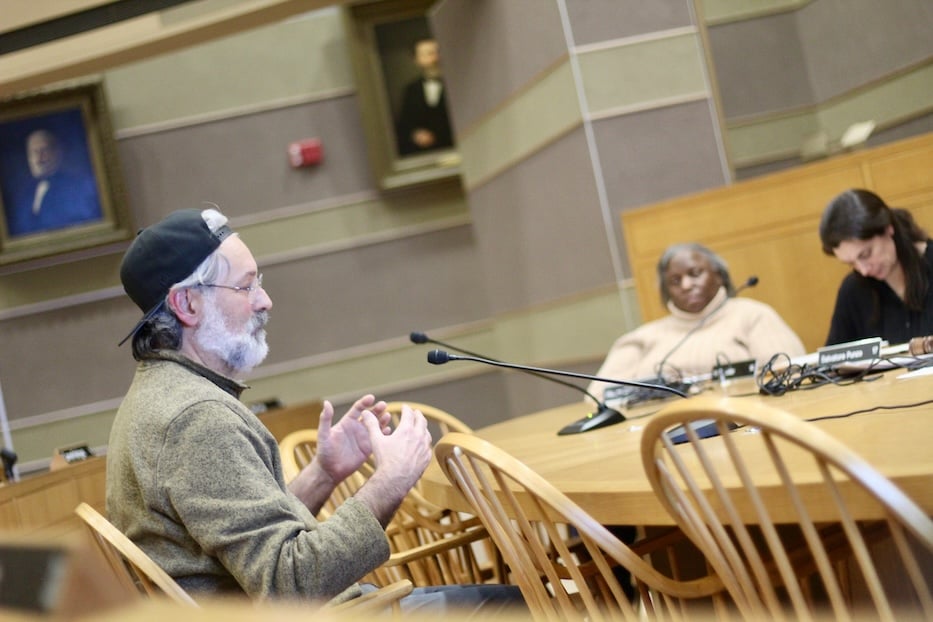
Scott Meikle, who teaches theater at Co-Op.
Their words echoed as fellow students recalled bullying, harassment, and unsupportive school environments that have become part of their experience in the New Haven Public Schools. Fifth grader Wesley Bianchine, who came out as nonbinary in elementary school, described their frustration with gendered bathrooms and teachers who assign “boys versus girls” teams in class, refusing to acknowledge their gender identity.
Evie Poynter, an eighth grader at Elm City Montessori School, recalled watching her trans sibling experience bullying as a young kid, simply because there was no gender-neutral bathroom at her former school. After transferring into Elm City Montessori, “our family hoped that it would be more accepting,” in no small part because of an Anti-Bias, Anti-Racist or ABAR curriculum that sits at the school’s core.
Still, Evie sees microaggressions unfold frequently at the school—and believes they could be addressed with more resources from the district. In addition to social workers and comprehensive trainings for every school, she called for better health and sex education curricula, including lessons on hormone replacement therapy and in vitro fertilization.
"As someone growing up in the New Haven Public school system that has two moms, I am tired of the feelings of otherness that are directly caused by the exclusion of "non-traditional” pregnancy and parenthood," Evie said. "Thank you for reading my testimony. I hope you consider it as you move forward."
.jpeg?width=933&height=622&name=EduWorkshopNov23%20-%201%20(1).jpeg)
Manuel "Manny" Camacho, who graduated from James Hillhouse High School in June. Camacho recalled hearing homophobic language in the hallways and the classrooms, from both his peers and his teachers.
Manuel Camacho, who identifies as an ally and is now a freshman at Southern Connecticut State University, recalled hearing anti-gay vitriol in the hallways and the classrooms of James Hillhouse High School, from which he graduated last June. Beyond students who harass each other, he said, “there are so many staff” with internal bias and a lack of training, who have failed to support their students when it may matter most.
He remembered a math class last year, in which the teacher told a student to “just pray about it” when he expressed feeling unsafe at school as an LGBTQ+ student. Instead of providing mental health resources, the teacher "decided he was going to put his religious views on the whole class."
“I couldn't believe it,” Camacho said. And yet, "I’ve seen it on so many occasions."
It’s something that their parents and teachers have seen too. NHPS parent Sara Armstrong, internship coordinator at New Haven Academy, recalled the number of times her son, a senior at James Hillhouse High School, has heard homophobic and transphobic slurs in school hallways. Brazauski, who chose to foster Lopes to provide him with a sense of security, echoed that concern and urged alders to increase opportunities for professional development and LGBTQ+ affirming training in the schools.
Lucy O’Connell, an NHPS parent and nurse midwife at Fair Haven Community Health Center, called for stronger and more robust sexual health curricula, from lessons on puberty to teachers who know how to speak about sex, sexuality, and gender identity. She recalled the number of times her son, who is trans, was forced to use the more public, in-class bathroom while menstruating. If he wanted access to a more private bathroom, he had to announce the fact that he was menstruating—which can often carry a sense of shame and body dysmorphia.
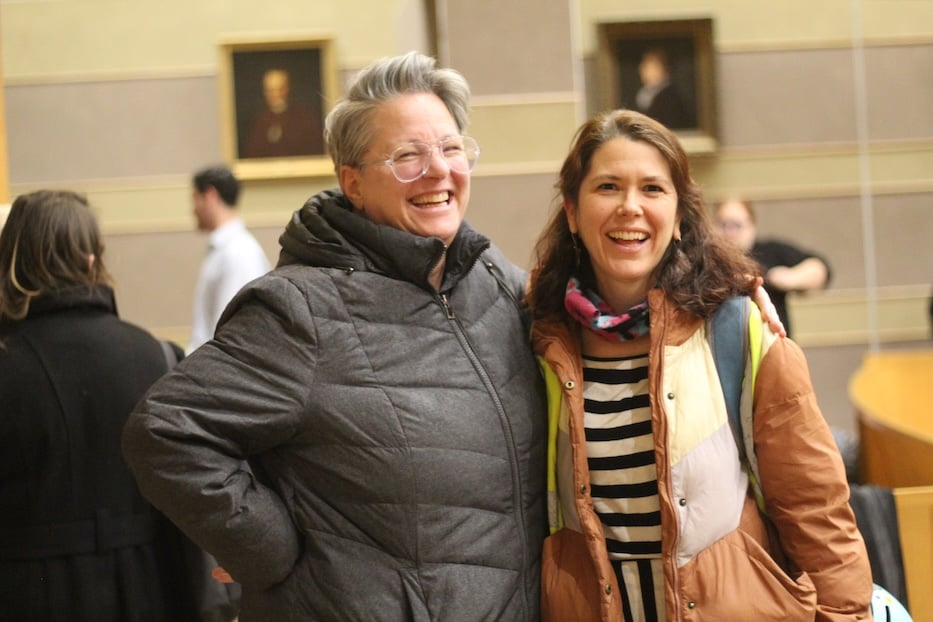
O'Connell and Armstrong: NHPS can do better.
“NHPS is out of compliance with a state law that provides clear benchmarks in fourth, eighth, and twelfth grade for sexual health education,” she said, noting the lack of a program structured around puberty. “My trans son describes this omission as a cruelty inflicted by NHPS. Despite the sexual education he received at home, he felt woefully unprepared navigating puberty at a New Haven Public School.”
“Every day, I see the harms due to inadequate sexual education in NHPS in my own children and my own patients,” she added.
Others noted the importance of LGBTQ+ visibility and access for not just queer students and their allies, but also for students who are still in the closet, and not yet ready to come out. Lopes, who founded and has maintained the GSA at High School in the Community, advocated for more single-stall gender neutral bathrooms, a boon to both queer students and “students who just don’t feel safe using them.”
Currently, students have to request a pass specifically for the gender-neutral bathroom, which can feel like an admission. While HSC is a small school, he said, that doesn't mean it doesn't have the same problems as its larger counterparts in the district.
“It’s a space that everyone can use without having to semi-out themselves” he said.
The child of a South Korean immigrant mom and Southern dad, newly elected Alder Caroline Tanbee Smith remembered growing up in Kentucky, around people who weren’t as familiar with what it meant to be LGBTQ+. In the midst of it, seeing GSAs thrive gave Smith hope. She didn't come out as gay until she was in New Haven, she said, but was buoyed by knowing that other LGBTQ+ people and resources were out in the world.
“There was fear and there was anxiety, and so for me, I wasn’t ready to be a part of a GSA,” she said. “But I saw them … and even just knowing that they existed made a difference.”
To watch more from Wednesday’s workshop, click on the video above.

